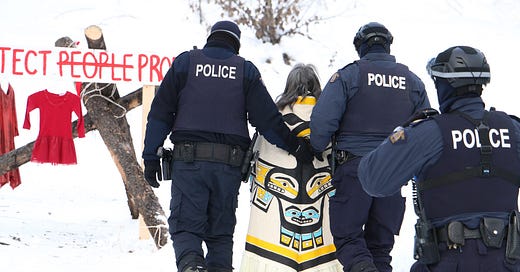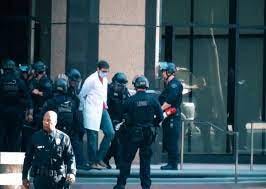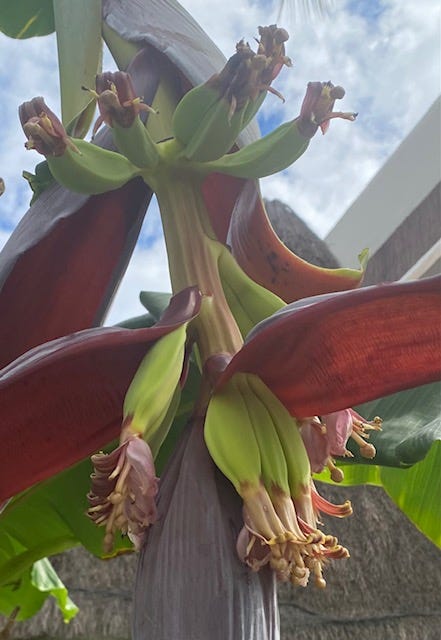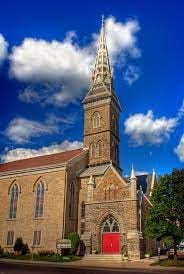COP27: The "Political Impossibility" of Reducing Global Heating
Hello friends. As I sit down to write, it is a very cold day here in Ottawa. I am so glad! While it doesn’t allow me to forget about the reality of the climate crisis, there is a certain reassurance in the frostbite-warning temperatures that are normal here for this time of year.
Today, I am reflecting on COP27, and the prospects for global efforts to reduce fossil fuel emissions. In the November 25 edition of The Guardian Weekly, Damian Carrington offers an analysis of the outcomes from COP27. He writes:
“The world should be sprinting to rid itself of its fossil fuel addiction as if lives depend on it, because they do, but it is jogging on the spot. The 1.5C goal may not yet be physically impossible to achieve, but Cop27 has shown it is politically impossible.”[1]
This phrase, “politically impossible”, haunts me. Thanks to the scientists at the IPCC, we know that limiting global warming is physically possible; we have the current technology and means, globally, to make this happen. What is lacking, and was on clear display at COP27, is the political will. This political will is lacking in Canada, as well as in the major oil-producing countries around the world. Indeed, it is more than just a lack of will; it is about the wilful refusal of countries and the fossil fuel industry to put in place the limits that are necessary if we are to limit warming to 1.5C and thereby mitigate the worst effects to humans and the wider Earth community.
Based on what we witnessed at COP27, Carrington astutely notes, it is currently politically impossible to change. We are on a speeding crash course for humanity and much of the natural world.
What are we, as people of faith, to think, to do, in the face of this reality? How are we to confront the reality of the climate crisis, move forward in courageous discipleship, and live in hope?
There are three avenues for fighting back against the fossil fuel industry's and countries' wilfully refusal to limit emissions that Carrington suggests in his article. They are three avenues that we can intentionally take up, as people of faith, moving forward in faithful, radical discipleship:
Carrington says that the first place we need to fight back is “in the mind.” We need to look at the massive profits made by the oil and gas industry, and “imagine redirecting that financial firepower at decarbonising the world.” In other words, we need to work at imagining a new world, a new way of living and acting in the world, collective, from the grassroots, up through various levels of government, into the global arena. As people of faith, envisioning a new world is a bedrock in our scriptures. We have been promised a new world, the kingdom of God. We have the imaginative muscles to help envision a new, decarbonized world! In this area, we can be leaders in the wider community in doing this envisioning work.
Carrington suggests that we must fight the fossil fuel industry, and the governments that are tied to it, on the streets in peaceful protest, as well as directly on lands that are being destroyed through fuel extraction. There is a long history of Christian nonviolent protest that we can draw upon. Indigenous leaders have been leading this fight already; settlers like me can figure out how to support them and continue the fight in our own regions and contexts.
Finally, Carrington suggests that we need a fossil fuel non-proliferation treaty to keep coal, oil and gas reserves alone, and to hold industry and government to account. As people of faith, we can join others at the table of organizing and advocating for such a treaty.
Carrington does point out one hopeful result that emerged from COP27, which was the creation of a new loss and damage fund whereby rich countries can offer funds to support poorer countries as they seek to recover from climate change impacts, and to mitigate future damage. Leaders from these poorer countries had to fight tooth and nail to get this fund approved. So we know, then, that anything is, indeed, possible. While limiting warming to 1.5C may currently be political impossible, it does not have to remain that way.
As people of faith, we have witnessed in our Scriptures, as well as the stories of our ancestors in faith, where it has seemed impossible to confront and change the political status quo. And yet, tyrants have been overthrown, and the people have persevered! What part can you play in reversing the current reality of the politically impossible? What faithful discipleship can you engage in, through imaginative work, political protest, sitting at the global table to create a non-proliferation treaty, or more?
[1] Damian Carrington, “On the brink: The 1.5C climate goal died at Cop27, but we can’t let hope go the same way,” The Guardian Weekly (25 Nov. 2022 Vol. 207, No. 22), 14. Print edition.
Announcements
The Ottawa Energy Collective is holding its first OEC Energy Roundtable of 2023 on Monday, January 23, from 1:00-3:00 pm EST. For more information and to register for the Zoon meeting, click here: http://events.r20.constantcontact.com/register/event?llr=o546abdab&oeidk=a07ejjlfenya93f0902
BLOG POST: Finding Joy in Discipleship (and the Kitchen)
Find it here: https://jessicahetherington.ca/blog/
Scripture Reflection
1 The Lord is my light and my salvation;
whom shall I fear?
The Lord is the stronghold of my life;
of whom shall I be afraid?
4 One thing I asked of the Lord,
that will I seek after:
to live in the house of the Lord
all the days of my life,
to behold the beauty of the Lord,
and to inquire in his temple.
5 For he will hide me in his shelter
in the day of trouble;
he will conceal me under the cover of his tent;
he will set me high on a rock.
6 Now my head is lifted up
above my enemies all around me,
and I will offer in his tent
sacrifices with shouts of joy;
I will sing and make melody to the Lord.
7 Hear, O Lord, when I cry aloud,
be gracious to me and answer me!
8 ‘Come,’ my heart says, ‘seek his face!’
Your face, Lord, do I seek.
9 Do not hide your face from me.
Do not turn your servant away in anger,
you who have been my help.
Do not cast me off, do not forsake me,
O God of my salvation! (Psalm 27:1, 4-9, NRSV)
This psalm is in the revised common lectionary for this coming Sunday, the collection of readings that are read in many traditions each week. We continue to be in the season of Epiphany, and so we see the theme of light in the opening verse: “The Lord is my light and my salvation; whom shall I fear?”
I don’t know about you, but I really need to read this psalm and be reassured right now. As I said above, while the means exists to move to greenhouse gas emissions reduction, the political will does not. Indeed, we see the wilful forces of destruction and greed moving forward at a frenzied pace to keep burning coal, gas and oil. This scares me. It scares me not only for myself and my children, but especially for those living in the global South, who are already experiencing devastating weather events as a result of climate change.
And so, I need to be reminded that God is my light and my salvation, my stronghold. I need to be reminded, by praying this psalm, that I need not fear. I need to be reminded to ask God to be my shelter, my safe place. “For he will hide me in his shelter in the day of trouble…”
How is God my shelter, in this time of anxiety and chaos? This isn’t about retreating from the cries of the world, waiting for an otherworldly time in which all suffering will disappear. This isn’t about believing that God will simply take care of everything, and so we don’t have to act.
No. It is, instead, about resting in our relationship with God; one’s intimate, individual relationship with God our Creator, Redeemer and Sustainer. It is about grounding ourselves in the truth of who God is for us, as Christians; the truth of the Gospel. Through this rest and grounding, God is my shelter.
We are sheltered as we rest in our relationship with God, as we ground ourselves in the truth of the Gospel, even as chaos and anxiety rages within and around us. We are sheltered, knowing that God is the God of all the Earth community. God is here with and among us; in the struggles and the pain, in the fires and the floods, in the poverty and the violence. And God is here in the flowers and the snow, the mountains and the meadows, the streams and the desert.
In verse four the psalmist sings of seeking to “live in the house of the Lord all the days of my life, to behold the beauty of the Lord…” I invite you to pray this psalm today, pray for the reassurance it offers, pray to feel yourself centered and grounded in the house of God, who is within and around us and the entire Earth community. AMEN.
Discipleship in Action
This idea for discipleship in action is my boldest yet; hear me out! Have you ever been willing to get arrested on behalf of the Earth community? How far might you be willing to go in order to bring about effective climate action and other changes for ecological healing?
These are the questions I have been asking myself this week, especially since Monday was Martin Luther King, Jr. Day. Rev. Dr. King was arrested 29 times for acts of civil disobedience, as well as trumped-up charges designed to intimidate and silence him. He did not, however, let the arrests and times in jail stop him from his discipleship of speaking and acting out against white supremacy and the imperial state. King modelled a radical discipleship of nonviolent resistance, taking to the streets in peaceful protest, and preaching a model of relationships within what he called the “beloved community”.
Today, indigenous and climate activists are being arrested as they fight for climate justice. Fourteen indigenous protestors were arrested for blocking a pipeline being constructed on unceded Wetsuwet’en territory in BC in 2019. Climate scientist and activist Peter Kalmus and others were arrested after chaining themselves to a JPMorgan Chase building in Los Angeles, in protest against that bank’s financing of fossil fuels.
When we consider what God is calling us to do in response to the ecological crisis, especially climate change, what might he be calling us to? How far are we willing (and able) to go? I think that this is an important question to ask, and to be honest with ourselves about the answer (I’m still struggling with this one, myself). I invite you to seriously ponder this question, especially in light of how strongly the powers-that-be are currently fighting to keep the status quo, high-carbon-emitting lifestyle, alive. Getting arrested for peaceful protest can be discipleship in action.
Stories of Discipleship in Action: I would love to include stories of how subscribers to this email have lived out their discipleship in response to climate and ecological crisis. If you would like to share, send me an email. I can post your story with or without your name, as you feel comfortable. Email me at: jessica@jessicahetherington.ca.
Earth Community in Pictures
Thank you to the subscribers who sent int the following beautiful photos!
Here is a gorgeous banana tree from the Mayan Riviera. Who knew how stunning they are? Thank you to Cristina for sending this in:
The following are part of Lin's collectiion of houseplants in her home in Orleans. She told me recently that it takes her an hour to water all of the plants in her house! The Earth community, up close:
I would love to share more pictures of the wider Earth community, whether they are indoors or out, both flora and fauna. Send pictures to: jessica@jessicahetherington.ca.Thanks!
Upcoming Events
Guest Preaching: February 26, 2023 – Wall Street United Church, Brockville ON. More details to come.
Contact
Any questions or comments? Things you'd like to see in this newsletter? I'd love to hear from you. Please go to jessicahetherington.ca, or email me at: jessica@jessicahetherington.ca.









